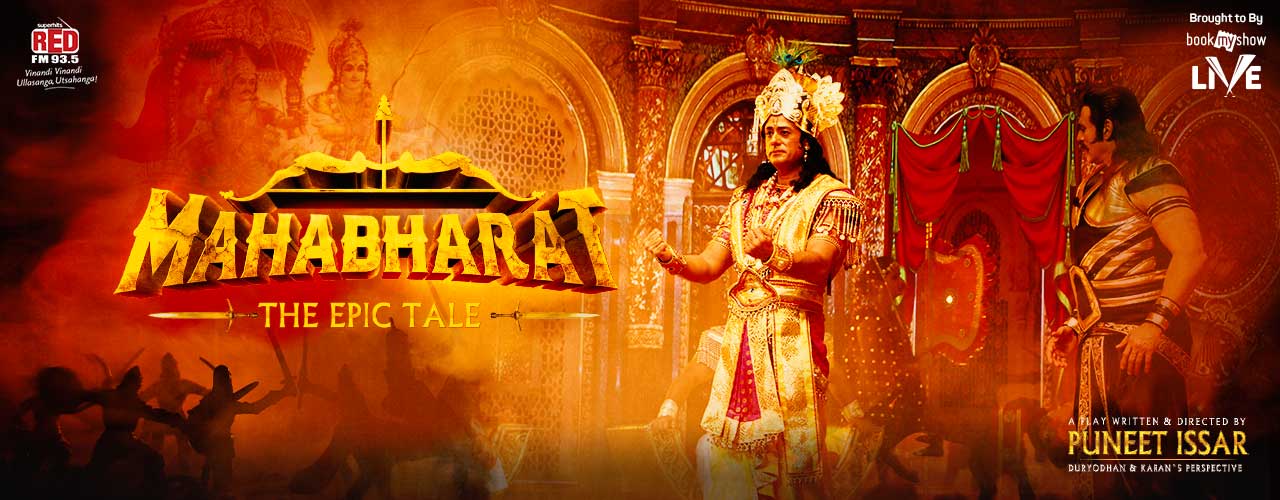Being one of the two greatest epics of ancient India, Mahabharat stands as an utmost important historic ancient Indian texts. The epic play is staged around not older than 400 BCE. The play revolves around the battle between two clans of cousins for their struggle to come into power; The Kauravas and the Pandavas, the two branches of a family battle for the throne of Hastinapur, in the Kurukshetra war.
Kauravas, the sons of Dhritarashtra and the descendants of Kuru battle, wage a long war of enmity and hatred against the Pandavas, the sons of Pandu.
The verse is made up of almost 100,000 couplets, and the authorship is ascribed to the sage Vyasa.
The saga begins when the blindness of Dhritarashtra, the elder of the two princes, make him incapable of claiming the throne, which is then passed on to his younger brother Pandu. However, a misfortune wished upon Pandu stops him from fathering children. Kunti, his wife, prays to the Gods to father Pandu's offsprings. As a result, the Wind fathers Bhima, Dharma fathers Yudhishtira, Indra fathers Arjuna, and the Ashvins father Nakula and Sahadeva.

The enmity and jealousy among the cousins make the Pandavas go into exile after their father dies. Later, the five Pandavas jointly marry Draupadi, who emerges out of a sacrificial fire and is won over by Arjun in a game of shooting arrows. They meet Krishna, their cousin, who stays their companion and friend after that. When the Pandavas return to the kingdom, they are again sent to exile when Yudhisthira gambles away his everything to Duryodhana, the eldest of the Kauravas.
Krishna narrates the Bhagavad Gita to Arjuna when he fears to go to the battle against his brothers. The tale tells us that sometimes we ought to make choices that violate our values and codes to emerge out victorious. Mahabharata is the epic which demonstrates the role of our choices and decisions made in our life.
Kauravas, the sons of Dhritarashtra and the descendants of Kuru battle, wage a long war of enmity and hatred against the Pandavas, the sons of Pandu.
The verse is made up of almost 100,000 couplets, and the authorship is ascribed to the sage Vyasa.
The saga begins when the blindness of Dhritarashtra, the elder of the two princes, make him incapable of claiming the throne, which is then passed on to his younger brother Pandu. However, a misfortune wished upon Pandu stops him from fathering children. Kunti, his wife, prays to the Gods to father Pandu's offsprings. As a result, the Wind fathers Bhima, Dharma fathers Yudhishtira, Indra fathers Arjuna, and the Ashvins father Nakula and Sahadeva.

The enmity and jealousy among the cousins make the Pandavas go into exile after their father dies. Later, the five Pandavas jointly marry Draupadi, who emerges out of a sacrificial fire and is won over by Arjun in a game of shooting arrows. They meet Krishna, their cousin, who stays their companion and friend after that. When the Pandavas return to the kingdom, they are again sent to exile when Yudhisthira gambles away his everything to Duryodhana, the eldest of the Kauravas.
Krishna narrates the Bhagavad Gita to Arjuna when he fears to go to the battle against his brothers. The tale tells us that sometimes we ought to make choices that violate our values and codes to emerge out victorious. Mahabharata is the epic which demonstrates the role of our choices and decisions made in our life.
Comments
Post a Comment